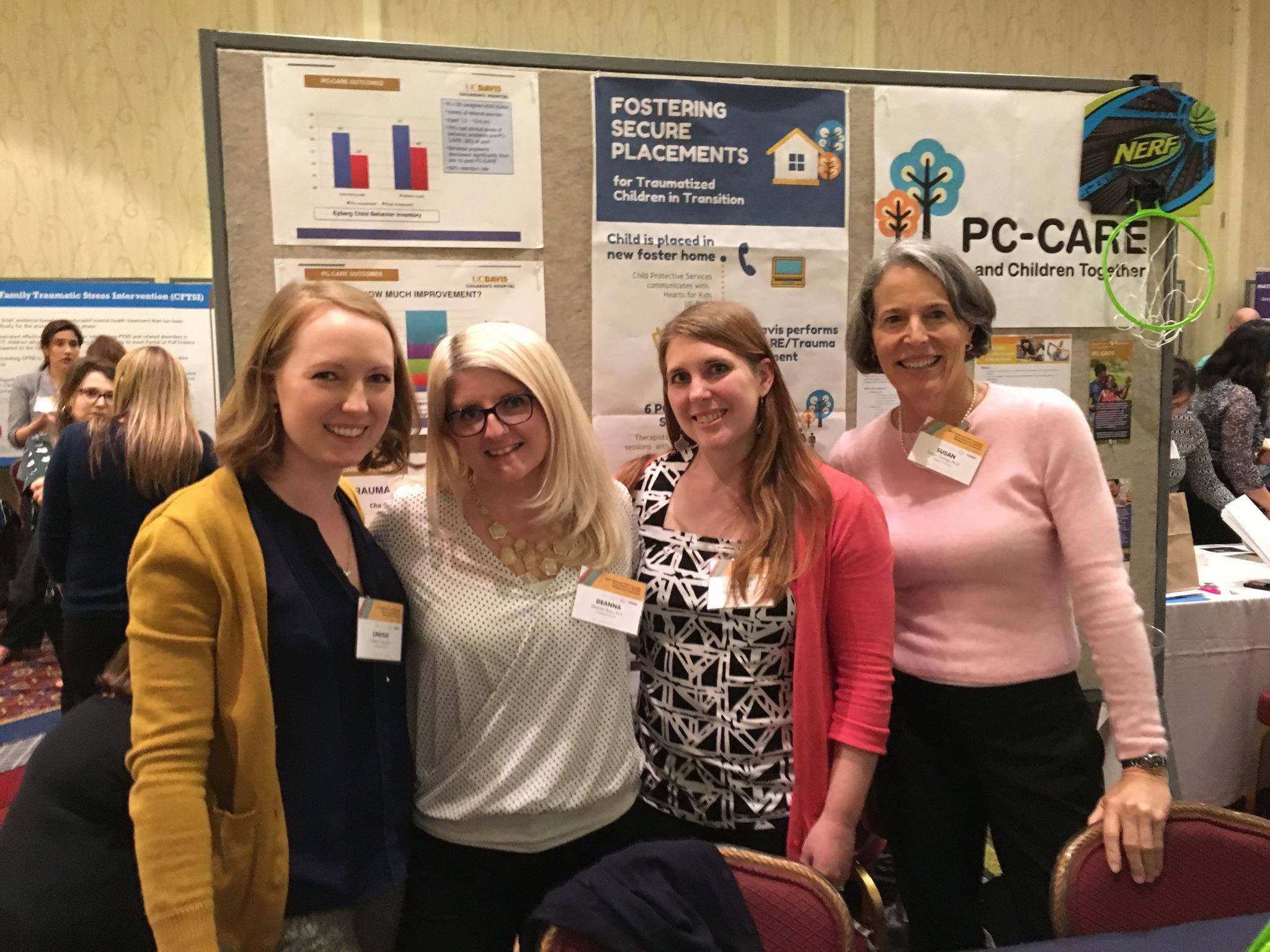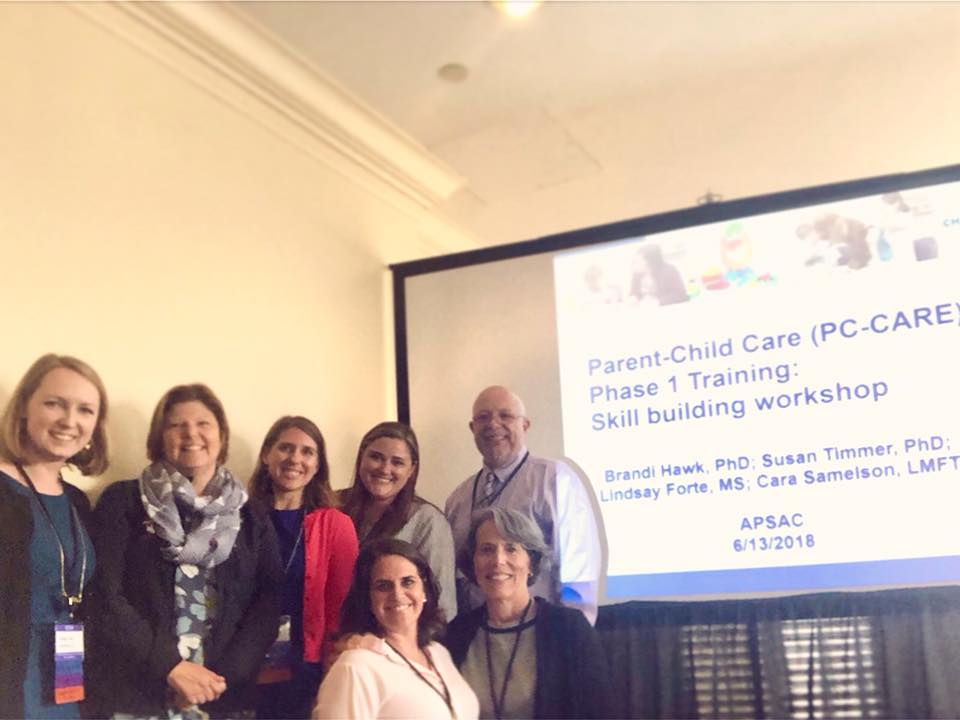PC-CARE Research
PC-CARE Research Articles
Publications
- Hawk, B. N., Timmer, S. G., Armendariz, L. A., Boys, D. K., Urquiza, A. J., & Fernández y Garcia, E. (2022). Improving children’s behavior in seven sessions: A randomized controlled trial of Parent-Child Care (PC-CARE) for children aged 2–10 years. Child Psychiatry & Human Development, 1-14.
PDF: RCT of PC-CARE Springer Link: RCT of PC-CARE - Timmer, S. G., Hawk, B. N., Usacheva, M., Armendariz, L. A. F., Boys, D. K., & Urquiza, A. J. (2021). The Long and the Short of It: A Comparison of the Effectiveness of Parent–Child Care (PC–CARE) and Parent–Child Interaction Therapy (PCIT). Child Psychiatry & Human Development. doi: 10.1007/s10578-021-01257-9
PDF: The Long and Short of it Springer Link: The Long and Short of It - Hawk, B. N., Timmer, S. G., Armendariz, L. A. F., Boys, D. K., & Urquiza, A. J. (2020). Improving behaviors and placement stability for young foster children: An open trial of Parent-Child Care (PC-CARE) in the child welfare system. Children and Youth Services Review.
PDF: Improving behaviors and placement stability for young foster children - Hawk, B.N., Timmer, S.G., & Urquiza, A.J. (2018) PC-CARE: A Promising Brief Parent-Child Intervention. Section on Child Maltreatment Insider, 23(1), p. 8-10
PDF: PC-CARE: A Promising Brief Parent-Child Intervention (p8-10) - Hawk, B. N. & Timmer, S. G. (2018). Parent–Child Care as a Brief Dyadic Intervention for Children With Mild to Moderate Externalizing Problems: A Case Study. Clinical Case Studies SAGE Journals.
PDF: Parent-Child Care – Case Study SAGEPub link: Parent–Child Care – Case Study - Timmer, S. G., Hawk, B. N., Forte, L. A., Boys, D. K., & Urquiza, A. J. (2018). An Open Trial of Parent–Child Care (PC-CARE)-A 6-Week Dyadic Parenting Intervention for Children with Externalizing Behavior Problems. Child Psychiatry & Human Development. doi:10.1007/s10578-018-0814-8
PDF: Open Trial of PC-CARE Springer link: Open Trial of PC-CARE
Presentations
- Timmer, S.G., Hawk, B.N., Forte, L.A., & Boys, D., Samelson, C., Urquiza, A.J. (June 2018). Presentation and workshop at the American Professional Society on the Abuse of Children APSAC 25th Annual Colloquium – New Orleans, LA
- Timmer, S.G., Hawk, B.N. (May 2018). Presentation at World Association of Infant Mental Health’s 16th World Congress – Rome, Italy
- Timmer, S.G., Hawk, B.N., Forte, L.A., & Boys, D. (November 2017). Fostering Secure Transitions with PC-CARE. Presentation at the Zero to Three Annual Conference, San Diego, CA
- Hawk, B., & Forte, L. (September 2017). PC-CARE: Fostering Secure Placements for Traumatized Children in Transition. Presentation at The 17th Annual Conference on Parent-Child Interaction Therapy for Traumatized Children, Los Angeles, CA
- Hawk, B., & Forte, L. (June 2017). Adapting EBTs: Can a 6-week Parenting Intervention Really Help? Presentation at The 2017 APSAC Advanced Training Summit, Portland, ME
- Timmer, S., Hawk, B., Boys, D., & Forte, L. (April 2017). PC-CARE: A Brief Parenting Intervention for Traumatized Children in Transition or with Disruptive Behaviors. Presentation at The 2017 NCTSN All Network Conference, Washington, D.C.
- Hawk, B., & Forte, L. (September 2016). PC-CARE: Creating an Affectionate and Respectful Environment in Only Six Sessions! Presentation at The 16th Annual PCIT Conference, Los Angeles, CA.
- Timmer, S., & Hawk, B. (September 2016). PC-CARE: A Case Study. Presentation at The 16th Annual PCIT Conference, Los Angeles, CA.
Annual Reports
2018-2019 Annual Report
University of California at Davis CAARE Diagnostic and Treatment Center, Dept of Pediatrics. (2019) Fostering Secure Placements for Traumatized Children in Transition, Annual Report, 10/18 – 9/19.
On The Web
- NCTSN has listed PC-CARE as a trauma intervention on their website. We’re thrilled to be affiliated with the National Child Traumatic Stress Network!
- PC-CARE is listed on the California Evidence-Based Clearinghouse for Child Welfare CEBC. The CEBC is funded by the California Department of Social Services’ (CDSS’) Office of Child Abuse Prevention and is one of their targeted efforts to improve the lives of children and families served within child welfare system. We are so excited to be part of the listings on CEBC as we continue to build research on the efficacy of PC-CARE for caregivers and children! ➡️ Read about PC-CARE on the CEBC website here: https://www.cebc4cw.org/program/parent-child-care-pc-care/
- UC Davis Health Newsroom Feature: Shorter therapy for caregivers of children with behavioral challenges is effective



The UC Davis CAARE Center is funded by the Center for Mental Health Services, Substance Abuse and Mental Health Services Administration (SAMHSA), U.S. Department of Health and Human Services (HHS) (SM63268). The views and opinions of authors expressed in this (document, product, web site) do not necessarily state or reflect those of the Substance Abuse and Mental Health Services Administration (SAMHSA) or the U.S. Department of Health and Human Services (HHS).




